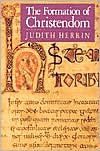

 |

|

The average rating for The Formation of Christendom based on 2 reviews is 4 stars.
Review # 1 was written on 2018-06-26 00:00:00 Luigi Carchia Luigi CarchiaWhen it comes to historical writing, there's definitely a scale reaching from "dry academic" to "readable popular" history. THE FORMATION OF CHRISTENDOM falls slightly toward the academic end of the spectrum. For example, you would be best served to read a good, racy history of Byzantium before tackling it (I can recommend John Julius Norwich's SHORT HISTORY OF BYZANTIUM) and even then, you might find this book somewhat chewy. However, while this is not the most accessible history book I've ever read, it's also far from being the driest. And as I kept telling everyone who would listen, it's an extremely important book. Judith Herrin is a rare bird among medieval historians in that she seems sensitive and sympathetic about the importance of religion to the medieval world without taking sides, whether Roman Catholic or Eastern Orthodox. THE FORMATION OF CHRISTENDOM tackles history from roughly 312 to 843, tracing the dismantling of the Roman empire and its division among three main heirs: the papal-Frankish alliance in the west, the Eastern Roman empire in the east, and Islam in the south. Herrin's major focus is less on politics than it is on the theological and ecclesiastical developments that usually drove the politics; late in the book she defines medievalism as the period dominated by religion. Herrin traces a number of strands throughout this magisterial volume: the gradual urbanisation of the old Roman empire; the gradual process by which Roman culture and Byzantine culture diverged, driven by differing theological traditions; the remarkable influence in Visigothic Spain and Carolingian Francia of Isidore of Seville; and more. This book sheds real light on the history of the period often known as the "Dark Ages". Herrin painstakingly traces the long and slow process by which Rome came to claim absolute authority over the church, the debates over icons in the sixth and seventh centuries, and exactly why ecumenical church councils ceased to be held after 787. We watch as the erstwhile Roman cities around the Mediterranean claim self-government and autonomy both in civil government and in the church. We watch the Carolingian church's uneasy relationship with Rome, sometimes appealing to them for help in liturgy and doctrine but ultimately unafraid to build their own theological traditions. As this book shows, the monolithic institutional church unity envisaged by Rome and Constantinople was deeply problematic in practice. Not only were these two rival bishoprics unable to agree with each other long before the Great Schism of 1054, they were also split with dissent and had regular trouble convincing outsiders (such as the Franks, the Irish, Visigothic Spain or pre-conquest Carthage) to play ball. While the ecumenical pentarchy of the early centuries (Rome, Constantinople, Antioch, Jerusalem, and Alexandria) claimed authority over all Christians, and while Rome claimed authority over the pentarchy, men like Isidore of Seville and the 794 Synod of Frankfurt insisted that authority in the church should stem from true faith rather than tradition, and from servant leadership rather than domination in the state: "Unlike past emperors, the new rulers share fully in the human condition and must convince their Christian subjects by counsel and good example, rather than by force." Neither Isidore nor the Carolingian clergy he inspired were slow to declare that in cases where they conscientiously believed themselves to be in the right, both Rome and Constantinople lacked authority. THE FORMATION OF CHRISTENDOM is a wonderfully profound book and this review only scratches the surface. I would recommend it to everyone with an interest in church history, especially the history of authority, diversity, and unity in the church. This book is available as a PDF from the Internet Archive. |
Review # 2 was written on 2015-12-12 00:00:00 Joseph Gaspard Joseph GaspardI had chosen this book hoping for something a little different from what I have. Not Dr. Herrin's fault, mind you, but I am interested in the rise of Christianity as a civil religion and, by the time that the book starts, that was pretty established. What Dr. Herrin discusses is, largely, the rise of the ecclesiastical supports for the Latin West. She does it through a learned and interesting consideration of the Byzantine East and of Islam's influence, but the culmination of the book is Charlemagne and the Carolingian order. Not that that isn't a worthy subject, mind you, and I think Dr. Herrin does that analysis better than most. It isn't her only concern, of course. The ghost of Pirenne hangs over her treatment of the 7th century as she seems to accept the basic premise that Islam shut down Mediterranean trade and forced the West to stop looking East for legitimization. Again, not a bad thing, but just as a note of where she was in the 1980s when she wrote this. The Pirenne thesis was beginning to be old hat around that time (as I recall from my university days) and it hasn't gained in acceptance in the intervening time. Dr. Herrin writes from the standpoint of a non-believer. She is quite explicit about this in her preface, arguing that the subject was too important to be left to adherents of the religions. That sticks a little in my left-nostril because of the implication that those views from inside are deficient, but I also have to grant that the author is even-handed and, even, rather sympathetic to the subject matter. She handles her source material sensitively and takes seriously the theological discussions she treats. That is the mark of a good historian, of course, which I already knew from some of her other books. While starting to get a bit long in the tooth, Formation of Christendom is still a good read, especially for those concerned with the transition from Late Antiquity to the Middle Ages. |
CAN'T FIND WHAT YOU'RE LOOKING FOR? CLICK HERE!!!